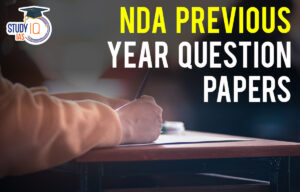Table of Contents
The Union Public Service Commission (UPSC) administers the National Defence Academy (NDA) exam twice annually to choose candidates for the Indian Army, Navy, and Air Force. With NDA 1 and NDA 2 being held in 2025, candidates must familiarize themselves with the updated NDA Syllabus 2025, particularly for major subjects such as Mathematics and English.
Here in this article, we will share a comprehensive NDA syllabus for 2025, particularly for Mathematics and English, and a direct link to download the PDF syllabus.
NDA Syllabus 2025
UPSC NDA Syllabus 2025 is divided into two subjects Maths and GAT. NDA Maths Syllabus contains questions from Algebra, Calculus, Integral Calculus and Differential Equations, Matrices and Determinants, Analytical Geometry Of Two and Three Dimension, Trigonometry, Vector Algebra, and Statistics Probability. It is based on the class 12 curriculum. The NDA General Ability Tests Syllabus consists of topics from Physics, English, Social Studies, Chemistry, General Science, Geography, and Current Events. It holds the maximum weightage in the UPSC NDA Syllabus 2025.
| Overview | |
| Name of the Exam | National Defence Academy, NDA |
| Exam Conducting Body | Union Public Service Commission, UPSC |
| Frequency of NDA Exam | Two times a year
|
| Selection Process | Written Test consisting of Objective Type Questions Intelligence & Personality Test (SSB) |
| Mode of exam | Offline |
| Total Papers in NDA Exam |
|
| Total Marks for NDA Exam | Total: 900 Marks
|
| Total No. of Questions |
|
| Negative Marking |
|
| Exam Duration |
|
Asprinsts can check NDA Salary Here!
NDA Syllabus For Paper 1
NDA Paper 1 is a written exam consisting of 120 questions of Maths of 10+2 level. In this exam, candidates will get 2.5 marks for each correct answer and there is also a negative marking of 0.83 marks deducted for each incorrect answer. The NDA syllabus for Paper 1 includes Mathematics topics which are provided in detail in the section below.
| NDA Syllabus for Paper 1 | |
| Total Marks | 300 Marks |
| Total No. of Questions | 120 |
| Correct Answer | 2.5 marks |
| Marks deducted for the wrong answer | – 0.83 |
| Total duration of Mathematics Paper | 2 Hours 30 Minutes |
NDA Maths Syllabus 2025
The Mathematics section of the NDA exam holds a significant weightage, comprising Paper 1 with a maximum of 300 marks. Achieving success here demands consistent practice and dedicated efforts. Candidates need to prioritize accuracy and speed to tackle the diverse range of topics within the allocated time. Below is a concise breakdown of the NDA Maths Syllabus :
Algebra
| Topics | Description |
|---|---|
| Set theory | Basic principles of sets and their operations. |
| Venn diagrams | Visualization of set relationships. |
| De Morgan laws | Rules governing set complements. |
| Relations and Cartesian product of equivalence | Understanding relationships and combining sets. |
| Real numbers on a line | Representing real numbers visually. |
| Modulus, argument, and cube roots of complex numbers | Properties and operations involving complex numbers. |
| Binary number system | Understanding and converting numbers between binary and decimal systems. |
| Progressions in geometry | Arithmetic and geometric progressions. |
| Real-coefficient quadratic equations | Solutions and properties of quadratic equations with real coefficients. |
| Graph-based solutions to two-variable linear equations | Solving linear equations using graphical methods. |
| Combination and permutation | Counting and arranging elements. |
| Binomial theorem and its uses | Expanding binomials and applications. |
| Applications for logarithms | Practical uses of logarithmic functions. |
Matrices and Determinants
| Topics | Description |
|---|---|
| Matrix types and operations | Basic matrix operations and types. |
| Characteristics of determinants | Understanding determinant properties. |
| Matrix determinant | Calculating determinants of matrices. |
| Inverse and adjoint of a square matrix | Finding inverses and adjoints. |
| Applications (Cramer’s rule, Matrix method) | Solving systems of linear equations using Cramer’s rule and Matrix method. |
Trigonometry
| Topics | Description |
|---|---|
| Angles and their measurements | Measurement units and concepts. |
| Trigonometric ratios | Sine, cosine, tangent, etc., and their relationships. |
| Sum and difference formulas | Formulas for the sum and difference of trigonometric identities. |
| Multiple angles and sub-multiple angles | Trigonometric operations involving multiple and sub-multiple angles. |
| Inverse trigonometric operations | Functions like arcsin, arccos, arctan, etc. |
| Applications (height and distance, triangular properties) | Practical applications in geometry. |
Analytical Geometry of Two and Three Dimensions
| Topics | Description |
|---|---|
| Cartesian coordinates | Basics of rectangular coordinates. |
| Distance calculation | Calculating distances between points. |
| Equations of lines | Various forms and properties. |
| Equations of conic sections (circle, parabola, ellipse, hyperbola) | Standard forms and characteristics. |
| Equations involving planes and lines | Relationships between planes and lines in 3D space. |
| Equations of a sphere | Characteristics of spheres. |
Differential Calculus
| Topics | Description |
|---|---|
| Real-valued functions | Concepts of domain, range, and function graphs. |
| Limits | Understanding the limit concept and standard limits. |
| Continuity and derivatives | Operations on continuous functions and derivatives. |
| Derivatives of composite, one-to-one, and inverse functions | Differentiation techniques for various functions. |
| Derivatives of second order | Calculating second-order derivatives. |
| Applications (maxima and minima) | Using derivatives in maxima and minima problems. |
Integral Calculus and Differential Equations
| Topics | Description |
|---|---|
| Standard integrals (algebraic, trigonometric, exponential) | Basic integration techniques. |
| Integration techniques (substitution, parts) | Methods like substitution and integration by parts. |
| Applications (area under curves, definite integrals) | Practical applications of integration. |
| Differential equations | Concepts of order, degree, and constructing differential equations. |
| Solutions to differential equations | General and specific solutions, first-order equations, and various forms. |
| Applications (growth and decay problems) | Real-world applications of differential equations. |
Vector Algebra
| Topics | Description |
|---|---|
| Vectors in two and three dimensions | Properties of vectors, magnitude, and direction. |
| Vector operations (addition, scalar multiplication) | Basic operations on vectors. |
| Dot and cross-products | Scalar and vector products of two vectors. |
| Applications (work done, moments, geometrical problems) | Practical applications in physics and geometry. |
Statistics
| Topics | Description |
|---|---|
| Data classification | Organizing data into categories. |
| Frequency distribution and cumulative frequency distribution | Displaying data distribution. |
| Graphical representation (frequency polygons, histograms, pie charts) | Visualizing data using different charts. |
| Measures of central tendency (mean, median, mode) | Statistical measures representing data center. |
| Variance and standard deviation | Measures of data spread. |
| Correlation and regression | Analyzing relationships and trends in data. |
Probability
| Topics | Description |
|---|---|
| Basics (random experiment, events, sample space) | Fundamentals of probability theory. |
| Events (mutually exclusive, exhaustive, impossible, certain) | Different types of events. |
| Probability rules (intersection, union, complementary) | Fundamental probability rules. |
| Probability theorems (conditional probability, Bayes’ theorem) | Advanced probability concepts and theorems. |
| Random variables | Introduction to random variables and their applications. |
| Binomial distribution | Probability distribution for specific experiments. |
Question Disturbance for Math’s Subject in given table:-
| Topic | Questions |
| Calculus | 20-25 |
|
Quadratic equation
|
20-15 |
|
Matrices & Determinants
|
30 |
| Probability | 10 |
| Trigonometry | 30 |
|
Complex number
|
10-15 |
Candidate can solve the NDA Previous Year Question Paper Here!
NDA Syllabus For Paper 2
General Ability Test (GAT) is the next paper in the written exam, which includes the topics like General Knowledge (GK), English, Chemistry, Physics, Geography, General Science, and Current Events. The NDA syllabus for Paper 2 includes 150 questions in total including 50 questions from English and the remaining 100 questions from General Knowledge which includes other subjects and current affairs. The basic overview of the NDA syllabus for Paper 2 is as follows:
| NDA Syllabus for Paper 2 | |
| Total Marks for GAT Paper | 600 marks |
| Total No. of Questions | 150 Questions |
| Total questions in English | 50 Questions |
| Total Questions in GK | 100 Questions |
| Total Marks for English | 200 marks |
| Total Marks for GK | 400 marks |
| Marks for Correct Answer | 4 marks in each section |
| Marks for Incorrect Answer | -1.33 marks in each section |
| Total Duration of GAT Paper | 2 Hours 30 Minutes |
Candidates can check NDA Eligibility Criteria 2025 Here!
NDA English Syllabus 2025
English is the Part A of Paper 2 General Ability Test (GAT) in the written exam of NDA 2025. To increase their scores in the English section, candidates should read newspapers on a daily basis. They should also highlight any difficult or new words and find their definitions to improve their vocabulary and also improve to solve the reading comprehension section questions. The objective of this paper is to evaluate the candidates’ command of the English language and their capacity for formal word usage.
- Reading Comprehension & cohesion Questions.
- Cloze Test Questions
- Spotting the Error Questions.
- Fill in the Blanks Questions.
- Synonyms & Antonyms and Vocabulary Questions.
- Idioms and Phrases Questions.
- Sentence Arrangement or Para Jumbled Questions.
- Ordering of words in a Sentence Questions.
- Sentence Improvement or Sentence Correction Questions.
- Grammar and their usage type Questions
Question Disturbance for English Subject in given table:-
| Topic | No. of Questions | No. of Marks |
| Spotting Errors | 5 | 20 |
| Comprehension | 6 | 24 |
|
Selecting Words
|
10 | 40 |
|
Ordering of Words in a Sentence
|
9 | 36 |
|
Sentence Improvement
|
10 | 40 |
| Antonyms | 5 | 20 |
| Synonyms | 5 | 20 |
| Total | 50 | 200 |
NDA General Knowledge Syllabus 2025
The General Knowledge section, Part B of Paper 2 (General Ability Test), is a crucial component of the NDA 2025 written exam. It encompasses diverse disciplines, including Physics, Chemistry, General Science, Social Studies, Geography, and Current Events. The syllabus is designed to cover a broad spectrum of topics. While the list is not exhaustive, candidates must exhibit a comprehensive understanding of the subjects. Here’s a concise overview of the NDA Syllabus for Paper 2 General Knowledge:
| General Knowledge Syllabus for NDA 2025 |
|---|
| Physics |
| Chemistry |
| General Science |
| Social Studies |
| Geography |
| Current Events |
NDA Physics Syllabus 2025
| Topics | Description |
|---|---|
| Physical characteristics | Properties of matter and its states. |
| Archimedes principle | Buoyant force and its application. |
| Newton’s Laws of Motion | Principles governing the motion of objects. |
| Gravitation | Law of universal gravitation and its effects. |
| Work, Power, and Energy | Basic concepts and their interrelations. |
| Heat | Effects of heat, temperature, and heat transfer. |
| Light and Sound | Properties of light, reflection, refraction, sound waves, and musical instruments. |
| Magnetism and Electricity | Earth as a magnet, electrical power, conductors, Ohm’s Law, magnetic effects of current. |
| Simple Machines and Tools | Principles and functions of various tools and machines. |
NDA Chemistry Syllabus 2025
| Topics | Description |
|---|---|
| Chemical and physical changes | Characteristics of changes in matter. |
| Law of Chemical Combination | Fundamental principles of chemical combinations. |
| Elements, Mixtures, and Compounds | Basics of substances and their compositions. |
| Hydrogen, Oxygen, Nitrogen, Carbon Dioxide | Preparation, properties, and reactions of gases. |
| Salts, Bases, and Acids | Properties and reactions of common chemicals. |
| Carbon Varieties | Different forms of carbon. |
| Materials Manufacturing | Production of various substances such as soap, glass, ink, and paints. |
| Atomic Structure and Valency | Basics of atomic structure, molecular weights, and valency. |
NDA General Science Syllabus 2025
| Topics | Description |
|---|---|
| Living and Non-living Things | Distinctions between living and non-living entities. |
| Basis of Life | Tissues, protoplasm, and cells. |
| Human Body Organs | Major organs and their functions. |
| Epidemics and Food | Causes and prevention of common epidemics, human dietary components. |
| Solar System and Scientists | The Solar System, comets, meteors, eclipses, and contributions of renowned scientists. |
NDA History Syllabus 2025
| Topics | Description |
|---|---|
| Indian History | Comprehensive examination focusing on culture, civilization, and the Indian Freedom Movement. |
| Indian Government and Constitution | Basic understanding of the Indian government and constitution. |
| Social and Political Movements | Teachings of Mahatma Gandhi, Bhoodan, Sarvodaya, and modern world influences. |
| World History | Renaissance, exploration, and revolutions, including the Industrial Revolution, Russian Revolution, and French Revolution. |
| Science and Technology Impacts | Social effects of science and technology. |
| Global Concepts and India’s Role | United Nations, Panchsheel, Democracy, Socialism, Communism, and India’s role in the modern world. |
NDA Geography Syllabus 2025
| Topics | Description |
|---|---|
| Earth’s Dimensions and Movements | Size, shape, movements, consequences, and genesis of the Earth. |
| Rocks and Weathering | Classification of rocks, weathering processes, earthquakes, and volcanoes. |
| Climate and Natural Regions | Climate types, natural regions, ocean currents, atmospheric phenomena, and India’s regional geography. |
| India’s Resources and Trade Routes | Resources, industrial and agricultural activities, important seaports, and trade routes. |
NDA Current Events Syllabus 2025
| Topics | Description |
|---|---|
| India and Global Developments | Knowledge of significant current events in India and worldwide. |
| Prominent Figures | Recognition of important personalities in sports, culture, and global affairs. |
Question Disturbance for General Knowledge Subject in the given table:-
| Topic | No. of Questions | No. of Marks |
| Physics | 23 | 92 |
| Chemistry | 16 | 64 |
|
General Science
|
11 | 44 |
|
History & Freedom Movement
|
16 | 64 |
| Geography | 17 | 68 |
| Current Affairs | 17 | 68 |
| Total | 100 | 400 |
NDA Syllabus 2025 PDF Download
The official NDA Syllabus has been provided below for candidates preparing for the NDA Exam. Only those who succeed in the written exam are eligible for the SSB Interview stage. The applicants will benefit from this article’s thorough explanation of the syllabus and will be one step closer to achieving their objectives.


 CDS Syllabus 2025, Download Subject Wise...
CDS Syllabus 2025, Download Subject Wise...
 NDA 1 Admit Card 2025 Out at upsc.gov.in...
NDA 1 Admit Card 2025 Out at upsc.gov.in...
 NDA Previous Year Question Paper, Downlo...
NDA Previous Year Question Paper, Downlo...





















